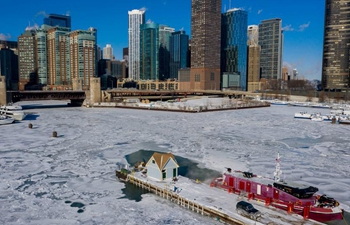WELLINGTON, Jan. 31 (Xinhua) -- As much as 14 billion NZ dollars (9.7 billion U.S. dollars) of infrastructure is at risk from sea level rise, according a new report released Thursday by the Local Government New Zealand (LGNZ).
"Changes in the climate will definitely impact us, principally in the form of rising sea levels, as two-third of all New Zealanders live within five kilometers of the sea," said LGNZ President Dave Cull, calling for urgently developing policies to help minimize the impact of climate change on New Zealand's communities.
The report modelled various sea level rise scenarios using topographical data from New Zealand's 62 local councils.
It showed that 2.7 billion NZ dollars of roading, three waters, and building infrastructure is at risk from as little as a 0.5-meter rise in sea levels. The value of at-risk infrastructure ramped up sharply at each increment of sea level rise, with the data showing 14.1 billion NZ dollars at risk at 3-meter rise.
"Many councils are already experiencing the impact of sea level rise, most notably in Bay of Plenty, the West Coast, South Dunedin and Hawke's Bay, but we haven't had an accurate nationwide understanding of the community-owned infrastructure that is at risk, until now," Cull said.
"Using sea level rise scenarios that are based on the best local and international scientific advice, our research paints a really stark picture for local communities," he said.
"That's not even factoring in the total value of assets at risk from sea level rise, which skyrockets when you start factoring things that sit on top of this infrastructure, like highways, homes, businesses, office buildings, hospitals, factories and schools," he added.
The report recommends local government leads a national conversation about response to sea levels rise; establishes a National Climate Change Adaptation Fund to ensure adaptation costs are shared equally; and establishes a Local Government Risk Agency to help councils understand and factor climate change risks into their planning, decision-making and procurement.
Other recommendations include local government joining hands with owners and users of exposed infrastructure to create a National Master Plan to prioritize options while responding to sea level rise.
"The threat is too big for us to fight alone," Cull said, adding New Zealand's local councils have for many years led the policy debate around climate change adaptation.
The president calls for a robust policy framework in place to ensure the disruption and harm to communities are minimized.
Minister for Climate Change James Shaw said the government is "acutely aware of" the impacts sea level rise could have on coastal communities.













